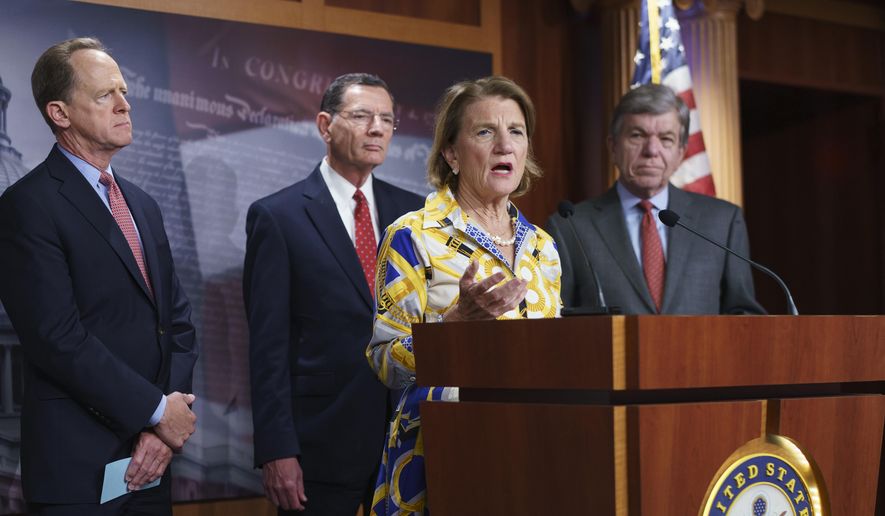Senate Republican negotiators are poised to reject President Biden’s proposal to pay for massive spending on infrastructure by imposing a minimum 15% tax on corporations, The Washington Times has learned.
They view the compromise offered by Mr. Biden as merely substituting one tax hike for another, said a congressional aide with knowledge of the negotiations.
“The country is still dealing with the economic impact of the coronavirus, including labor shortages and rising prices. Hiking taxes would only make this situation worse,” said the GOP aide.
The new offer from the White House also included paying for some of the roughly $1.7 trillion in infrastructure projects with new revenues from boosted enforcement efforts by the Internal Revenue Service.
The rejection of Mr. Biden’s compromise proposal signaled the negotiations, which were already at an impasse, are in jeopardy of collapse ahead of the administration’s self-imposed Monday deadline for a deal
Mr. Biden is set to meet Friday with the Republican’s lead negotiator, Sen. Shelley Moore Capito of West Virginia.
Ms. Capito’s team previously drew a “red line” on paying for infrastructure with tax hikes, especially rolling back the GOP’s 2017 tax cuts. Mr. Biden’s new minimum corporate tax would technically avoid erasing the tax cuts since the minimum tax on corporations would be a new tax.
Still, opposition to tax hikes spans the Republican conference, uniting both moderates and stalwart conservatives alike.
“This is is an issue that is central to the GOP, some are old enough to remember how badly former President George H. W. Bush got burned by raising taxes,” said the aide. “Others came up during the tea party era and understand just how unpopular tax hikes are among Republicans voters and the electorate as a whole.”
Mr. Biden first floated a minimum 15% corporate tax at a meeting Wednesday with Ms. Capito. The White House insisted it was a good compromise since the president was dropping a proposed increase of the corporate tax rate to 28% from 21%, which erased much of the relief from the GOP’s 2017 tax cuts.
“This should be completely acceptable to a number of Republicans who have said that their bottom line is they want to leave the 2017 tax law untouched,” said White House press secretary Jen Psaki.
The administration had initially proposed raising both income and corporate taxes to pay for the $2.25 trillion it proposed for infrastructure.
Republicans initially scoffed at Mr. Biden’s price tag and the proposed tax hikes, arguing it was extravagant in light of the massive debt racked up from coronavirus relief spending.
Last month, the Senate GOP unveiled a $568 billion infrastructure proposal that they called “fiscally responsible.” It directed funding explicitly at fixing the nation’s roads and bridges instead of the social welfare and climate change programs included in the Biden plan.
Since then, Republicans have upped their spending threshold and compromised on some of Mr. Biden’s green energy goals, including supporting spending on electric vehicle charging stations.
The president, meanwhile, has trimmed his total spending proposal to $1.7 trillion but has remained firm on raising taxes to pay for the new spending.
“He believes that we should continue to look at raising the corporate rate — that is a way to pay for a range of ideas,” Ms. Psaki said.
Even though negotiations are ongoing, little progress has been made. Both sides are divided over not only how to pay for any new spending, but also on the meaning of infrastructure. Mr. Biden’s proposal focuses heavily on what Democrats call “human infrastructure,” such as job retraining for felons and more public housing.
• David Sherfinski contributed to this report.
• Haris Alic can be reached at halic@washingtontimes.com.




Please read our comment policy before commenting.